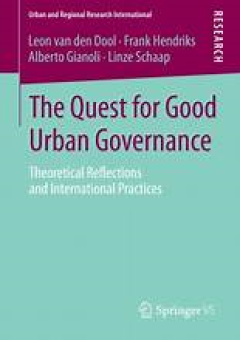Filter by

The Politics of Contaminated Sites Management
By the end of the 1970s, contaminated sites had emerged as one of the most complex and urgent environmental issues affecting industrialized countries. The authors show that small and prosperous Switzerland is no exception to the pervasive problem of sites contamination, the legacy of past practices in waste management having left some 38,000 contaminated sites throughout the country. This book …
- Edition
- 1
- ISBN/ISSN
- 978-3-319-11307-4
- Collation
- Politik
- Series Title
- -
- Call Number
- 324

Comparative Policy Agendas Theory, Tools, Data
The Comparative Agendas Project (CAP) brings together data on government activities in over twenty countries, and provides a consistent categorizing system to understand when a given institution of government in a particular country took action on any issue of public policy. All topics are covered, comprehensively, over several decades, in some countries going back to World War II. Because of t…
- Edition
- -
- ISBN/ISSN
- 9780198835332
- Collation
- -
- Series Title
- -
- Call Number
- -

Illiberal Trends and Anti-EU Politics in East Central Europe
This open access book provides an in-depth look into the background of rule of law problems and the open defiance of EU law in East Central European countries. Current illiberal trends and anti-EU politics have the potential to undermine mutual trust between member states and fundamentally change the EU. It is therefore crucial to understand their domestic causes, context conditions, specific p…
- Edition
- -
- ISBN/ISSN
- -
- Collation
- -
- Series Title
- -
- Call Number
- -

Coronavirus Politics
COVID-19 is the most significant global crisis of any of our lifetimes. The numbers have been stupefying, whether of infection and mortality, the scale of public health measures, or the economic consequences of shutdown. Coronavirus Politics identifies key threads in the global comparative discussion that continue to shed light on COVID-19 and shape debates about what it means for scholarship i…
- Edition
- -
- ISBN/ISSN
- 9780472902460
- Collation
- -
- Series Title
- -
- Call Number
- -

Transitional Justice in Nicaragua 1990–2012 Drawing a Line Under the Past
Astrid Bothmann examines historical, political and socioeconomic factors that explain the absence of transitional justice in Nicaragua from 1990 to 2012. The author provides the first systematic analysis of the reasons for the lack of transitional justice in Nicaragua after the end of the Sandinista regime and the civil war (1990). Contrary to other Latin American states of the third wave of de…
- Edition
- -
- ISBN/ISSN
- 978-3-658-10503-7
- Collation
- -
- Series Title
- -
- Call Number
- -

The Quest for Good Urban Governance
This book demonstrates both successes and failures in attempts to get closer to the ideal of good urban governance in cities in North-America, Europe, and Asia. It presents a value menu and deliberately does not come up with “one best way” for improving urban governance. Good urban governance is presented as a balancing act, an interplay between government, business and civil society in whi…
- Edition
- 1
- ISBN/ISSN
- 978-3-658-10079-7
- Collation
- X, 242, 9 b/w illustrations
- Series Title
- Urban and Regional Research International
- Call Number
- -

The Politics of Contaminated Sites Management
By the end of the 1970s, contaminated sites had emerged as one of the most complex and urgent environmental issues affecting industrialized countries. The authors show that small and prosperous Switzerland is no exception to the pervasive problem of sites contamination, the legacy of past practices in waste management having left some 38,000 contaminated sites throughout the country. This book …
- Edition
- 1
- ISBN/ISSN
- 978-3-319-11307-4
- Collation
- XIX, 159, 20 b/w illustrations, 8 illustrations in colour
- Series Title
- -
- Call Number
- -

The Politics of Budgetary Surplus
This book probes the hollow rhetoric of debt, deficits and austerity. It explores the decisions of parties of the left which have attempted to deflect criticisms of economic mismanagement and gain trust by depoliticising the budget process and financial management with various rules, albeit with elements of discretion. The book argues that this is a perverse form of trust as it is premised on t…
- Edition
- 1
- ISBN/ISSN
- 978-1-137-58597-4
- Collation
- XV, 187
- Series Title
- -
- Call Number
- -

The Sub-national Dimension of the EU A Legal Study of Multilevel Governance
This book is the first monograph-form legal study on multilevel governance in the EU and represents a radical change in the approach to this topic. Particularly after the Treaty of Lisbon’s entry into force, research on multilevel governance can no longer remain confined to the analysis of political dynamics or of soft law arrangements. Multilevel governance emerges as a constitutional princi…
- Edition
- -
- ISBN/ISSN
- 978-3-319-14589-1
- Collation
- -
- Series Title
- -
- Call Number
- -

The State as an Actor in Religion Policy Policy Cycle and Governance Perspec…
Maria Grazia Martino and her contributing authors highlight the different solutions found by European countries with different ecclesiastical law systems, different distributions of Christian denominations and different percentages of Muslim immigrants: Germany, Switzerland, France, Sweden, Italy and Greece. Churches and religious communities are actors from civil society. The state sets the fr…
- Edition
- -
- ISBN/ISSN
- 978-3-658-06945-2
- Collation
- -
- Series Title
- -
- Call Number
- -
 Computer Science, Information & General Works
Computer Science, Information & General Works  Philosophy & Psychology
Philosophy & Psychology  Religion
Religion  Social Sciences
Social Sciences  Language
Language  Pure Science
Pure Science  Applied Sciences
Applied Sciences  Art & Recreation
Art & Recreation  Literature
Literature  History & Geography
History & Geography